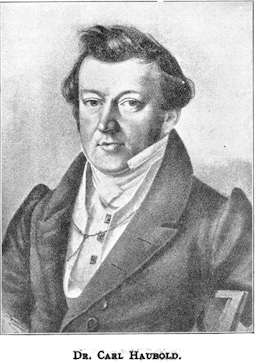Carl Haubold 1796 - 1862
January 26, 2009
 Carl Haubold 1796 - 1862 was
a German orthodox physician who converted to homeopathy.
Carl Haubold 1796 - 1862 was
a German orthodox physician who converted to homeopathy.
Carl Haubold was one of the earliest students of Samuel Hahnemann in Leipsig.
Carl Haubold was a member of the Board of Directors at the Leipsig Hospital alongside Georg August Benjamin Schweikert, John Ernst Stapf, Gustav Wilhelm Gross, Friedrich Jakob Rummel, Hartlandson, Georg August Heinrich Muhlenbein, Raehl, Paul Wolf, and of the Leipsic physicians Frantz Hartmann, J A Schubert, and Karl Friedrich Gottfried Trinks.
Haubold was instrumental in the formation of the Leipsig Association of Homeopathic Physicians in 1829 with Johan Joseph Wilhelm Lux, Moritz Wilhelm Mueller and Frantz Hartmann.
Carroll Dunham, writing in September 1867 in The American Homeopathic Review, says:
By the influence of Moritz Wilhelm Mueller, Frantz Hartmann and Carl Franz he was induced to investigate Homeopathy, and, as always happens where such investigations are undertaken in an honest and docile spirit, he soon became an enthusiastic adherent of the Hahnemannian system.
His abilities and acquirements gave him soon a prominent position among the Homeopathists, and his genial disposition, his moderation and courtesy, and his strict sense of justice enabled him to preserve a middle position between the two opposing parties into which Samuel Hahnemann’s early friends most unfortunately divided, and in 1833 he was the means of effecting a reconciliation between Samuel Hahnemann and those of his pupils who had so deeply offended him.
Dr. Haubold continued in the active practice of Iris profession until the beginning of the year 1861, when he began to feel the effects of the malady to which he finally succumbed. (American Homeopathic Review vol. 3, p. 144. See also Provers).